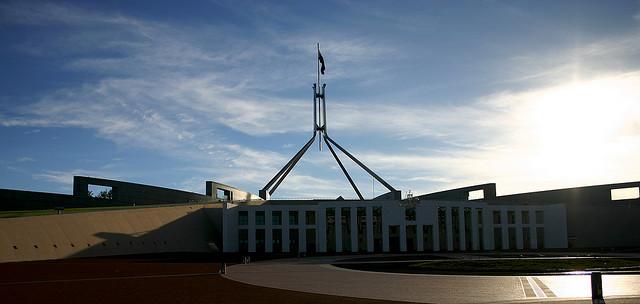Parliament must vote on any intervention against Islamic State forces
Posted By Heath Pickering on August 28, 2014 @ 14:30
 [1]
[1]On Monday, independent politician Andrew Wilkie called on [2] Prime Minister Abbott to seek parliament’s approval before using military force in Iraq. He said, ‘If Australia is to recommit combat troops to Iraq it must be…with the approval of the federal parliament’. His comments came amid reports [3] the Abbott Government is considering an extended military campaign against Islamic State forces in Iraq.
America has already begun air strikes against Islamic State forces in Iraq. But it might be forced to increase the scope of its campaign and possibly extend targeting into Syria. More extensive strikes could potentially bring in America’s allies, including Australia.
Wilkie’s comments provide a timely reminder that parliament’s powers for vetoing or deploying Australian military forces overseas are weak. In June Michelle Grattan [4] grappled with this debate about whether the parliament should authorise when and how Australia goes to war. Similarly in discussing the PM’s profound prerogative, Graeme Dobell wrote [5] that ‘Australia needs to confront systemic weakness, if not failure, and build in some stronger requirements for the future use of its armed forces’. In the interests of democratic scrutiny and ensuring that any intervention occurs with broad political support, RAAF air strikes in Iraq (and potentially Syria) must be supported by a parliamentary vote in both houses.
That line of argument follows not just Wilkie’s concerns, but also those of the Democrats and Australian Greens who have previously entered six ‘defence amendment bills’ into parliament to check prime ministerial war powers. Over the period from 1985 to 2014, five of those bills have failed to pass and one is currently before the House of Representatives (almost certain to fail). Both the major parties, Coalition and Labor, have voted against the bills.
The bills [6] (PDF) have aimed to amend the Defence Act 1903 echoing Wilkie’s stated provision:
… members of the Defence Force may not serve beyond the territorial limits of Australia except in accordance with a resolution, which is in effect and agreed to by both Houses of Parliament, authorising the service.
In contrast, the Defence Act [7] states: ‘Members of the Army may be required to serve either within or beyond the territorial limits of Australia’. It doesn’t specifically mention the proper authority to authorise the service.
The major parties are naturally sceptical and perceive an ulterior motive behind the bill. In 2011 Labor Senator Mark Bishop told the Senate [8] the bill appears to restrict overseas military deployments under any circumstance. Senator Scott Ludlam’s 2008 Bill also received scrutiny from the Senate Foreign Affairs, Defence and Trade Legislation Committee (FADTLC). Although the Committee expressed doubts about the credibility of the legislation and recommended the bill not proceed [9] (PDF), they stressed the importance of parliament’s involvement in ‘open and public debates about the deployment of Australian service personnel to warlike operations or potential hostilities’.
The current Minister for Defence, David Johnston, is on record [10] noting concerns with how the provisions of the bill would operate in practice:
No matter how positive are the underlying principles of this bill—and the bill is laudable—the impracticality of full disclosure to the parliament in a strategic sense and where intelligence, diplomacy and classified documents are concerned means that we must continue with the system as it now stands.
Britain has experienced a similar debate over its war powers. Like Australia, Britain shares a Westminster political system and is a close ally of the United States. Despite that, Britain has become more apprehensive about entering into international conflicts. Two parliamentary committees have recommended constitutional reform transferring the power to declare war from the executive to the House of Commons. Specifically, the House of Lords Select Committee on the Constitution [11] (PDF), which examines all public bills concerning constitutional issues, stated that:
Government should seek Parliamentary approval (for example, in the House of Commons, by the laying of a resolution) if it is proposing the deployment of British forces outside the United Kingdom into actual or potential armed conflict.
In support of that recommendation, former Prime Minister Gordon Brown publicly advocated [12] for constitutional reform, citing a need to establish a ‘more open 21st century British democracy’. Last year, David Cameron lost a non-binding parliamentary vote by 285–272 [13] to support an intervention in Syria.
Legislation to provide the parliament with the authority to approve the use of force is also becoming more common in liberal democracies. Countries like Germany, Italy, Denmark, and the Netherlands all require parliamentary approval before military deployments can be made. And America’s War Powers Resolution restricts the president’s use of armed forces beyond 60 days without support of the Congress.
Australia regularly involves itself in foreign conflicts. Media scrutiny and parliamentary debates do occur. But in the interests of both parliamentary accountability and public support, the government must allow a parliamentary vote on a future deployment to Iraq.
Heath Pickering [14] is a Master of International Relations graduate from the Melbourne School of Government. Image courtesy of Flickr user Prateek Rungta [15].
Article printed from The Strategist: https://aspistrategist.ru
URL to article: /parliament-must-vote-on-any-intervention-against-islamic-state-forces/
URLs in this post:
[1] Image: https://aspistrategist.ru/wp-content/uploads/2014/08/3143414861_f5b32f37e7_z.jpg
[2] called on: http://www.theaustralian.com.au/national-affairs/defence/tony-abbott-at-risk-of-repeating-iraq-war-mistake-andrew-wilkie/story-e6frg8yo-1227035829010
[3] reports: http://www.theaustralian.com.au/national-affairs/defence/raaf-may-join-us-air-strikes-on-islamic-state/story-e6frg8yo-1227035235446
[4] Michelle Grattan: http://theconversation.com/grattan-on-friday-should-parliament-have-the-right-to-say-whether-australia-goes-to-war-27939
[5] wrote: https://aspistrategist.ru/iraq-and-the-pms-profound-prerogative/
[6] bills: http://parlinfo.aph.gov.au/parlInfo/download/legislation/bills/r5281_first-reps/toc_pdf/14155Bandt.pdf;fileType=application%2Fpdf
[7] Defence Act: http://www.austlii.edu.au/au/legis/cth/consol_act/da190356/
[8] told the Senate: http://parlinfo.aph.gov.au/parlInfo/search/display/display.w3p;db=CHAMBER;id=chamber%2Fhansards%2Fe719b31b-5b1a-4e85-b13f-368ad7ba0c81%2F0187;query=Id%3A%22chamber%2Fhansards%2Fe719b31b-5b1a-4e85-b13f-368ad7ba0c81%2F0188%22
[9] recommended the bill not proceed: http://www.aph.gov.au/Parliamentary_Business/Committees/Senate/Foreign_Affairs_Defence_and_Trade/Completed%20inquiries/2008-10/dapaosb08/report/~/media/wopapub/senate/committee/fadt_ctte/completed_inquiries/2008_10/dapaosb08/report/report_pdf.ashx
[10] is on record: http://parlinfo.aph.gov.au/parlInfo/search/display/display.w3p;db=CHAMBER;id=chamber%2Fhansards%2Fe719b31b-5b1a-4e85-b13f-368ad7ba0c81%2F0185;query=Id%3A%22chamber%2Fhansards%2Fe719b31b-5b1a-4e85-b13f-368ad7ba0c81%2F0188%22
[11] House of Lords Select Committee on the Constitution: http://www.publications.parliament.uk/pa/ld200506/ldselect/ldconst/236/236i.pdf
[12] publicly advocated: http://news.bbc.co.uk/2/hi/uk_news/politics/6266344.stm
[13] 285–272: http://www.bbc.co.uk/news/uk-politics-23892783
[14] Heath Pickering: https://twitter.com/PickHeath
[15] Prateek Rungta: https://www.flickr.com/photos/rungta/3143414861
Click here to print.